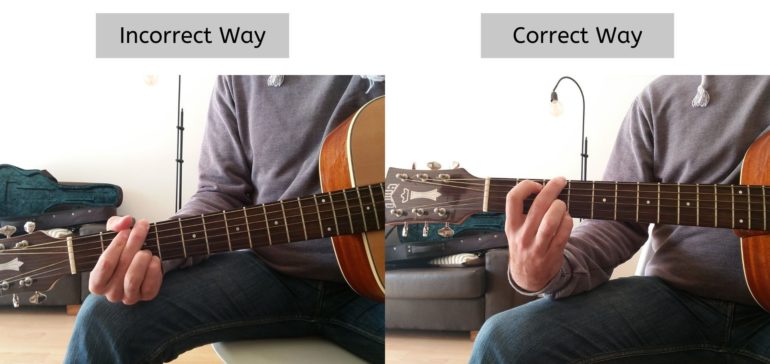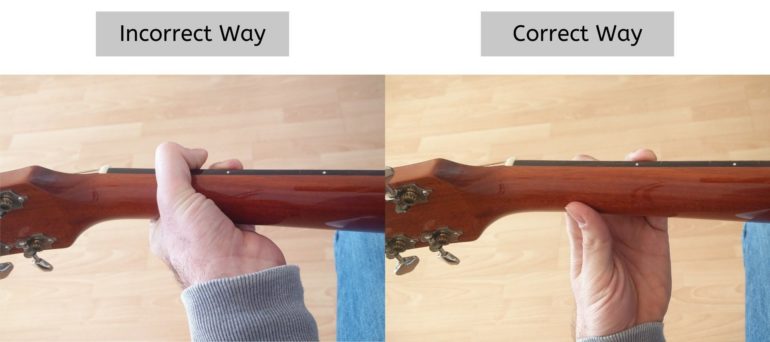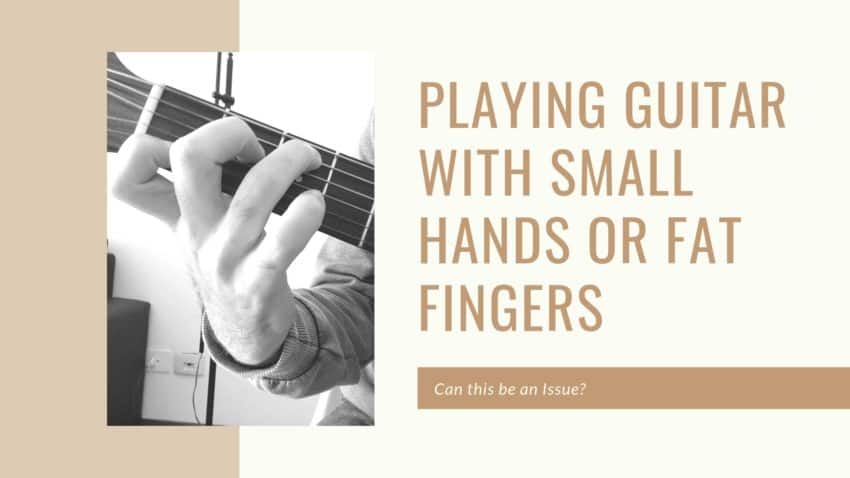Last updated on February 27th, 2020 at 08:48 pm
The first time you pick up a guitar it can be very frustrating, and I think that that’s why most people quit… because they can’t immediately get it to sound how they like.
What tends to happen is that you play a regular “C” chord, for example, but you can only hear like three strings clearly ringing out…
The other three are completely muted because they are making some sort of contact with your fingers that they shouldn’t.
This becomes very obvious with the first string for example; it just doesn’t sound at all.
This issue tends to happen for a couple reasons, but most people think that it’s because they either have extremely small hands or because they have chubby fingers.
While having bigger hands may make your life a bit easier and allow you to play John Mayer style songs more easily, it’s not really needed…
There are lots of excellent guitar players that have tiny hands and they can play way better than me… that’s for sure.
In this article I’ll try and give you an explanation to why this happens at first and why you shouldn’t quit, as well as give you some tips on what to do to alleviate this issue.
Can you play Guitar with small hands and fat fingers?
Yes!
When you first pick up a guitar you won’t be able to get all the notes to ring out properly, but this isn’t necessarily because you have small hands or fat fingers…
The reason this happens is because your hands aren’t used to those specific movements and need to be trained.
In other words, you need to practice.
If you don’t believe me just look at this amazing guitarist who has the tiniest hands I’ve ever seen:
Having larger hands will benefit you, of course… Just watch John Mayer playing the song “Neon”, for example, where he uses his thumb to play the bass notes.
He wouldn’t be able to do this if he had freakishly small hands… however, there are other ways to play that specific song that don’t require that you use the thumb at all, meaning that even with small hands you would still be able to play it.
If you do have extremely fat fingers, that might be an issue… but only if they are freakishly fat.
I remember that my first guitar teacher had some seriously fat fingers, however this didn’t affect his playing whatsoever… in fact, he was an absolute beast.
What I’m trying to say is that you just need to develop your muscle memory so that your hands know how to move around the fretboard…
Having larger or smaller hands with fat or skinny fingers won’t have that much of an impact.
There are some really common mistakes beginners make, however, that will often times leave them thinking that they have either one, or both, of these problems.
Common mistakes beginner guitar players make
Most beginners will do one of the following things… and some of them can even be fixed instantly.
Guitar positioning
This may be the most common mistake all beginners make.
For your hand that plays on the fretboard to be comfortable (if you’re right-handed then this would be your left hand), the fretboard needs to be parallel to the floor or pointing a bit upwards.
If the fretboard is pointing to the floor it will make it much harder for you, or anyone, to properly curl the fingers to play a chord how it’s supposed to.

In this picture I’m just showing how it would look, but you should try it yourself so you can get a good feel for what’s going on.
If the neck is pointing downwards, you’re going to feel very uncomfortable and everything you play will be that much harder.
Moving on…
Not properly curling the fingers
This is something that will come with practice, but not properly curling your fingers so that the tip can properly press down on the strings is something that happens to every beginner.
What this will do is mute all the strings that you shouldn’t mute; in the case of a C major you would most certainly be muting the open strings, which would be the 3rd and 1st strings…
But since your fingers aren’t properly curled you would also run the risk of even muting the other strings.
This is what it looks like;

Like I mentioned earlier, this just takes some time and practice… But it has nothing to do with how small of fat your hands are!
Next on the list is one issue I see very few people talking about, but it’s something that tends to happen to me and loads of other guitar players, be it complete newbies or seasoned ones.
Long fingernails
If you’re trying to play some chords, or anything for that matter, but the nails of your left hand are too long… good luck with that!
I consistently keep my fingernails as short as possible for the simple fact that if they are too long, they can come in contact with the fretboard when I’m pressing down on the strings.
This will do two things; on the one hand it just feels awful, but on the other hand, and this is much more important, it won’t allow you to properly press down on the string causing it to vibrate creating some “fret buzz” instead of sounding clearly.
So, keep the fingernails of your fretting hand short.
Lastly…
Not being able to stretch the hand enough yet
This comes back to what I mentioned about building your muscle memory.
When you first start out you feel like you can’t even stretch your fingers like three frets.
By this I mean that if you place your first finger on top of the first fret, you probably won’t be able to reach the fourth or fifth fret with your pinky.
I call this “not being able to stretch your fingers” but in fact it has to do with the position of your wrist.
If the palm of your fretting hand comes in contact, or is very close at least, to the neck of the guitar, it will make it super difficult for you to stretch your fingers.
This is why it’s important for your hand to have more of a neutral position, where only the thumb contracts the back of the neck.
In these pictures you should be able to see both examples; how to do it and how not to.

Of course, there are some music styles that require different hand positions in order to be played properly.
Tips on how to improve the “small hands” or “fat fingers” feeling
Aside from practicing and keeping your fingernails short I think that there are some things which you should take into consideration.
The first being…
Get a properly sized guitar
There’s a reason why kids use smaller guitars; it’s so that the guitar fits their anatomy.
I’m not saying that you should get a small kid’s guitar if you have tiny hands, but guitars have different neck widths and body sizes and choosing the right one for your needs may help you.
If you feel like you can’t really reach the notes you need to play, for example when playing a C chord and you can’t properly press down on the notes because you feel that they are too far apart, consider purchasing a guitar with a narrower neck.
This means that the strings will be closer together, making it easier for you to reach those notes.
This is one difference between acoustic/electric guitars and classical guitars.
The neck of a classical guitar is wider and often thicker than the one on acoustic or electric guitars.
The opposite also applies; If you have extremely fat fingers and can’t really press down on a single string without touching the other one, get a guitar with a wider neck.
Use a Capo
The closer you get to the body of the guitar the narrower the frets become.
If you’re having trouble reaching certain notes because you can’t stretch your fingers enough yet, don’t worry… just get a capo and practice a bit higher up on the neck.
Once you feel comfortable playing there, move the capo back a few frets and keep practicing there.
This is much simpler than learning directly on the last frets which are much wider and it should also help you improve quicker.
Lastly…
Practice
Whenever you learn anything new the most important thing to do is practice.
When first learning guitar it can be a total pain in the behind… trust me on that one, but you just need to get over those first few days, learn the basics and that’s it…
You will now start to enjoy it a lot more and won’t get frustrated as much.
I have pretty large hands and skinny fingers, but I also had that same issue where I couldn’t even get a simple D chord to sound good…
It’s not about your hands but rather about teaching them to move properly.
Conclusion
If you’re suffering of the small hands or fat fingers syndrome, or god forbid, both of them… Just remember that it’s not really an issue.
We’ve all been there. You just need to plow through it and before you know it you’ll be playing like an absolute beast!
I hope this information was useful…
Have a wonderful day!

Thank you, I figured practice would be the cure and you validated that hunch.